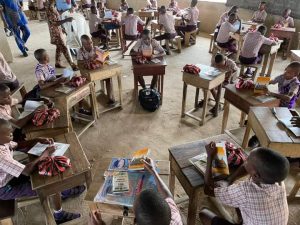International Day Of The Boy Child: Breaking Silence On Hidden Struggles Of Boys In Educational System
By Mercy Obot

Concerns affecting male children in Nigeria are frequently swept under the rug and underreported in the media space, fueling the harmful stereotype that boys are impervious to societal ills. Discussions about problematic situations are predominantly focused on the challenges faced by girls, while male children are left to navigate their struggles alone.
To commemorate the International Day of the Boy Child, it becomes pertinent to shatter this silence and cast a spotlight on the struggles and pressures boys encounter in Nigeria’s educational system.
The theme of this year’s celebration is poignant, as it focuses on “boys and their well-being, their needs to feel happy, healthy, and valued within family and community.” It also serves as a stark reminder of the heart-wrenching scenario encountered by male children in different regions and cultures globally, as well as the need to awaken societal consciousness towards cushioning any form of abuse causing trauma in the lives of boys.




According to UNICEF, a staggering 7.4 million boys are disengaged from education in Nigeria, while the United Nations Educational Scientific and Cultural Organisation (UNESCO) noted that one of the causes of most boys dropping out of school is the negative effects the educational system has on their mental health.
To highlight the bedevilling problems facing boys in schools, a confidential interview session was conducted with a cluster of boys in Uyo, Akwa Ibom State. They courageously shared their personal stories, offering a unique insight into the hardships and obstacles a boy child encounters during his educational journey in Nigeria.
Related: TAPA Sensitizes Public on Mental Health of Male Children
Narrating his harrowing experience, one of the male children said he is frequently bullied in school by his classmates, and such an act traumatises him. Sadly, bullying can have a profound impact on a boy child in the Nigerian education system, and the illicit acts by the perpetrators are often not reported, making it more worrisome because the victim is likely to have academic struggles.

The effect of bullying can be severe, leading to negative effects like social isolation where the child avoids communicating with his classmates or teachers, his self-esteem can be affected, and there is a place of physical harm where the child sustains a serious injury from beatings. Furthermore, bullying is a looming threat that can cause fear, mental health issues, indifference to education and long-term effects like an increased risk of suicide or substance abuse in a boy or child.
Another child shared that verbal abuse is one of the hindrances to his academic performance. The boy revealed his parents were using derogatory language against him, especially when he did not perform well in a particular subject.
This harmful attitude is prevalent among ill-tempered parents, and this can affect a boy child’s ability to thrive academically. Experts have cautioned against constant belittling and criticism of a male child, noting that this can lead to a boy child feeling worthless and eroding his self-confidence. And potentially causing learning difficulties, anxiety, aggressive behaviour and a lack of motivation to study.
Furthermore, discipline and punishment can form impediments to a boy’s education if not addressed appropriately. During the interview, a teenager complained of teachers being more lenient with female students by meeting out less severe punishments compared to the male students, who receive harsher punishments for the same misbehaviour.
This is an unconscious bias that can be attributed to societal gender stereotypes, and it becomes essential for teachers to treat children fairly regardless of their gender.
Meanwhile, the recent economic struggles in Nigeria have resulted in an increase in tuition fees in most educational institutions, making it difficult for students to have access to quality education.
Read Also: Sexual Abuse: The Males Are Not Exceptions
The significant hike in fees has forced some parents to withdraw their kids from private to public schools, and as a result of this, most male children have been affected. Limited resources have caused boys to drop out of school and start hustling on the street, leading them to sacrifice their education and prospects.
Venting his hurdle is a male child who spoke on machoism, which has to do with one having an exaggerated sense of masculinity to dominate.
Unfortunately, boys are expected to be strong and tough and lessen their display of emotions. These societal expectations can be toxic, and they can cause boys to develop a culture of silence by bottling up their problems and not reporting any abuse that may affect their mental health in school. Machoism can perpetuate harmful behaviours like bullying and physical fights.
In addressing such trends, it is important to create more supportive educational environments that enable boys to express their emotions while striving to develop their full potential.
The most sensitive issue often overlooked is sexual abuse against boys in the educational system. According to global statistics, 1 out of 6 boys experience some form of sexual abuse before the age of 18. Dishearteningly, this research may not reflect the true statistics of sexual abuse among male children due to underreporting by those victimised in the educational sector.
This troubling aspect increases daily as more boys in primary and secondary schools are preyed on by perpetrators due to negligence by teachers, parents, guardians and the general public. The disturbing misconception is that some individuals think that if a male child has physical arousal, it signifies consent or enjoyment, but this is a false notion and an inaccurate assumption.
Notably, the effects of molestation can be long-lasting and have an impact on a boy’s emotional, physical and psychological well-being. People tend to respond differently to sexual abuse, and it becomes necessary for school management to create awareness of these illicit actions and equally protect male children from paedophiles as they would from females.
To curb these highlighted issues posing a barrier to a boy’s educational progress, the first step is to acknowledge the existence of these obstacles staring at male children in the educational system. It is also essential to create a safe space for the male children to feel comfortable expressing their struggles or emotional concerns without being discriminated against in the process.
The school administration should establish and enforce policies addressing these various aspects to protect the mental well-being of male children and hold perpetrators accountable for their actions. The parents also have a critical role in protecting their sons by deliberately fostering open communication, providing guidance and counselling, and providing emotional support that will enable them to speak up.
Also, there is a need for government and non-governmental organisations to collaborate in raising awareness about the harmful societal stereotypes affecting male children and to educate the public on the challenges boys face in education and society as a whole.




